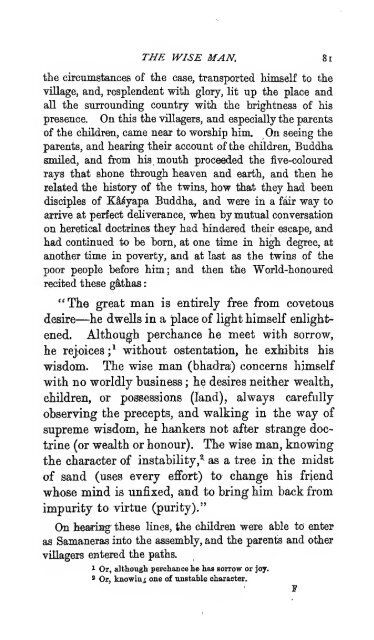Texts from the Buddhist canon : commonly known as Dhammapada
Texts from the Buddhist canon : commonly known as Dhammapada
Texts from the Buddhist canon : commonly known as Dhammapada
Create successful ePaper yourself
Turn your PDF publications into a flip-book with our unique Google optimized e-Paper software.
THE WISE MAN. 8i<br />
tlie circumstances of <strong>the</strong> c<strong>as</strong>e, transported himself to <strong>the</strong><br />
village, and, resplendent with glory, lit up <strong>the</strong> place and<br />
all <strong>the</strong> surrounding country with <strong>the</strong> brightness of his<br />
presence. On this <strong>the</strong> villagers, and especially <strong>the</strong> parents<br />
of <strong>the</strong> children, came near to worship him. On seeing <strong>the</strong><br />
parents, and hearing <strong>the</strong>ir account of <strong>the</strong> children, Buddha<br />
smiled, and <strong>from</strong> his mouth proceeded <strong>the</strong> five-coloured<br />
rays that shone through heaven and earth, and <strong>the</strong>n he<br />
related <strong>the</strong> history of <strong>the</strong> twins, how that <strong>the</strong>y had heen<br />
disciples of K^^yapa Buddha, and were in a fair way to<br />
arrive at perfect deliverance, when by mutual conversation<br />
on heretical doctrines <strong>the</strong>y had hindered <strong>the</strong>ir escape, and<br />
had continued to be born, at one time in high degree, at<br />
ano<strong>the</strong>r time in poverty, and at l<strong>as</strong>t <strong>as</strong> <strong>the</strong> twins of <strong>the</strong><br />
poor people before him; and <strong>the</strong>n <strong>the</strong> World-honoured<br />
recited <strong>the</strong>se gS,th<strong>as</strong><br />
:<br />
"The great man is entirely free <strong>from</strong> covetous<br />
desire—he dwells in a place of light himself enlight-<br />
ened. Although perchance he meet with sorrow,<br />
he rejoices ;^ without ostentation, he exhibits his<br />
wisdom. The wise man (bhadra) concerns himself<br />
with no worldly business ; he desires nei<strong>the</strong>r wealth,<br />
children, or possessions (land), always carefully<br />
observing <strong>the</strong> precepts, and walking in <strong>the</strong> way of<br />
supreme wisdom, he hankers not after strange doctrine<br />
(or wealth or honour). The wise man, knowing<br />
<strong>the</strong> character of instability,^ <strong>as</strong> a tree in <strong>the</strong> midst<br />
of sand (uses every effort) to change his friend<br />
whose mind is unfixed, and to bring him back <strong>from</strong><br />
impurity to virtue (purity)."<br />
On heading <strong>the</strong>se lines, <strong>the</strong> children were able to enter<br />
<strong>as</strong> Samaner<strong>as</strong> into <strong>the</strong> <strong>as</strong>sembly, and <strong>the</strong> parents and o<strong>the</strong>r<br />
villagers entered <strong>the</strong> paths.<br />
^ Or, although perchance he h<strong>as</strong> sorrow or joy.<br />
' Or, knowing one of unstable character.





